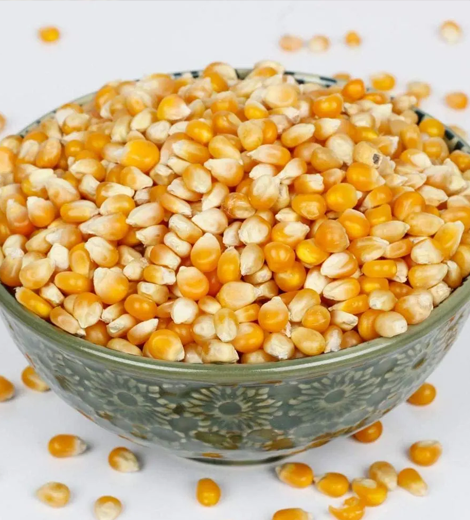
Corn Seeds
Corn seeds, also known as maize seeds, are the seeds of the corn plant (scientifically known as Zea mays). Corn is one of the most widely cultivated and important cereal crops worldwide, and its seeds serve as a staple food for many people.
Plant Type: Corn is a tall, annual grass plant that produces seeds within the cobs, which are part of the female reproductive structure.
Varieties: There are various types of corn, including sweet corn (consumed as a vegetable), field corn (used for livestock feed and industrial purposes), and popcorn (used for making popped snacks).
Food: Corn seeds are a versatile food source and can be consumed fresh, dried, or processed into various products. Sweet corn is commonly eaten as a vegetable, while field corn is used for making cornmeal, corn flour, corn oil, and corn syrup, among other things.
Animal Feed: Field corn is a primary component of animal feed for livestock, poultry, and aquaculture.
Industrial: Corn is used in various industrial applications, including the production of ethanol (used as a biofuel), starch, and numerous food additives.
Popcorn: Certain corn varieties, known as popcorn, have seeds that puff up and pop when heated. Popcorn is a popular snack food.
Corn has significant cultural and economic importance in many societies, especially in the Americas. It has been a staple crop for indigenous peoples and played a vital role in their diets and traditions.
Seeds: Corn seeds are typically large, oval-shaped, and vary in color depending on the variety. They can be yellow, white, red, blue, or even multicolored.
Cobs: The seeds develop on the cobs, which are the cylindrical, central part of the corn plant. Each cob is covered in husks and contains multiple rows of seeds attached to the cob by the ear, a stalk-like structure.
Pollination: Corn is wind-pollinated, and it has both male (tassel) and female (ear) reproductive structures on the same plant.
* Corn seeds are a good source of carbohydrates, primarily in the form of starch.
* They also contain protein, dietary fiber, vitamins (e.g., B vitamins), and minerals (e.g., magnesium, phosphorus).
* The nutritional content varies depending on the corn variety and its maturity when harvested.
Corn Seeds are the seeds of the corn plant, a versatile and widely cultivated cereal crop with various uses in human and animal nutrition, as well as in industrial applications. The nutritional content and uses of corn seeds can vary depending on the specific variety and how they are processed and prepared for consumption.
